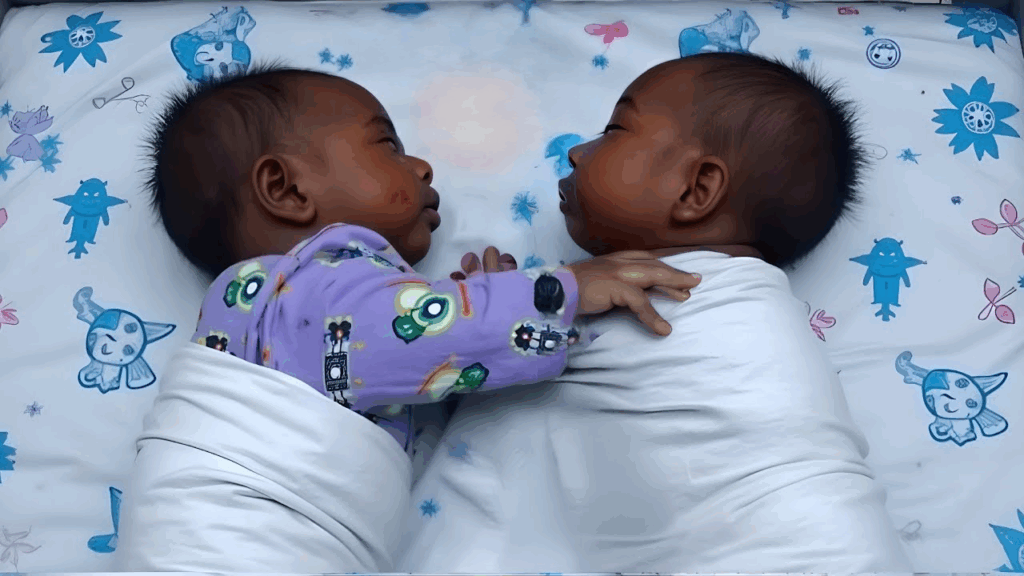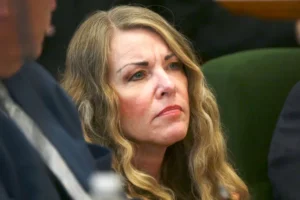Surrogate Mom Gives birth to twins, But The parents Refuse The Babies.

In a heartbreaking and highly unusual case that has sparked both ethical debate and public outrage, a California surrogate mother was left to care for twin newborns after the intended parents refused to take custody. The shocking reason? Only one of the babies was biologically theirs. The other—due to an extremely rare medical phenomenon—was the surrogate’s own biological child.

Danielle Owens, 29, from Riverside, California, entered into a legal surrogacy agreement with a married couple, Eric and Lisa (last names withheld for privacy), in 2024. The couple had long struggled with infertility and turned to surrogacy as their final hope of starting a family. After carefully selecting Danielle through a reputable agency, both parties signed extensive contracts and underwent counseling to ensure mutual understanding of expectations and rights.
Everything appeared to proceed normally. In the early months of pregnancy, Danielle carried a healthy embryo created from the couple’s fertilized egg. But at around 10 weeks, a routine ultrasound brought surprising news: she was carrying twins.
At first, everyone celebrated what seemed like a miracle—until genetic testing revealed a stunning twist.
A Rare Medical Mystery
Doctors concluded that Danielle had experienced superfetation, a medical phenomenon so rare that only a handful of cases have ever been recorded worldwide. It occurs when a woman continues to ovulate after becoming pregnant, allowing a second egg to be fertilized and implanted in the uterus alongside the existing embryo.
In Danielle’s case, she became pregnant with her own biological child—conceived naturally with her long-term partner—shortly after the embryo transfer from the intended parents. The two fetuses developed side by side, each genetically distinct and with different biological parents.
“When the doctors told me, I was in disbelief,” Danielle said in an emotional interview. “I didn’t even know this could happen. I followed all the medical guidance. I was just as shocked as the intended parents.”
What followed shocked not just Danielle but the entire surrogacy community. Upon learning that only one of the twins was genetically theirs, Eric and Lisa reportedly became distressed and overwhelmed. Legal sources say the couple expressed fear over the “complications of raising twins with different biological origins” and initially requested that Danielle terminate the pregnancy—a request she firmly declined.
As the pregnancy progressed, the couple’s communication became strained. By the time Danielle gave birth to the twin boys—each healthy and delivered at full term—the intended parents made a devastating decision: they would not take either baby home.
“They felt it was too complicated,” said a source close to the case. “Emotionally, legally, and financially—they weren’t prepared for this situation.”
Danielle was left in an impossible situation. Despite giving birth to both children, only one was biologically hers. The other—technically still the child of Eric and Lisa—was abandoned at birth, and its legal guardianship remained uncertain.
In the weeks that followed, Danielle fought to retain custody of both babies. Her partner, David, stood by her side as the couple took on the emotional and financial burden of raising two infants under extraordinary circumstances.
The surrogacy agency that facilitated the arrangement has since come under fire for failing to provide a clear contingency plan for rare complications like superfetation. Legal experts argue that the current surrogacy frameworks are woefully underprepared for cases that fall outside standard medical expectations.
“This case exposes a serious gap in our reproductive laws,” said Dr. Lila Simmons, a bioethics attorney based in Los Angeles. “There are no clear precedents or protections when something medically rare—and legally ambiguous—like this occurs.”
The story quickly gained national attention, with thousands taking to social media to express both sympathy and outrage.
“How could anyone leave a baby behind—especially one they planned for?” wrote one user on X (formerly Twitter).
Others sympathized with the parents’ fear, highlighting how emotionally and financially devastating an unexpected second child might be—especially one for whom they feel no legal or emotional responsibility.
Still, many agree: the children are the real victims.
“These babies didn’t ask for any of this,” said Danielle. “They deserve love and security. And I will give that to them—even if it wasn’t the life I expected.”
Danielle has begun the legal process of adopting the twin who is not biologically hers. Although it is unprecedented for a surrogate to adopt a child she carried for someone else, family court specialists believe a judge is likely to approve the petition based on the abandonment by the biological parents and Danielle’s commitment to both children’s welfare.
Meanwhile, pressure is mounting for lawmakers to reconsider the legal infrastructure surrounding surrogacy. Advocacy groups are calling for more robust legal frameworks to address unusual but medically possible events like superfetation.
“This case might be rare, but it should be a wake-up call,” Dr. Simmons said. “We must protect surrogates, intended parents, and most importantly, the children.”





